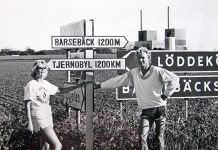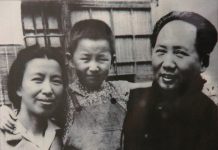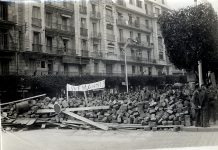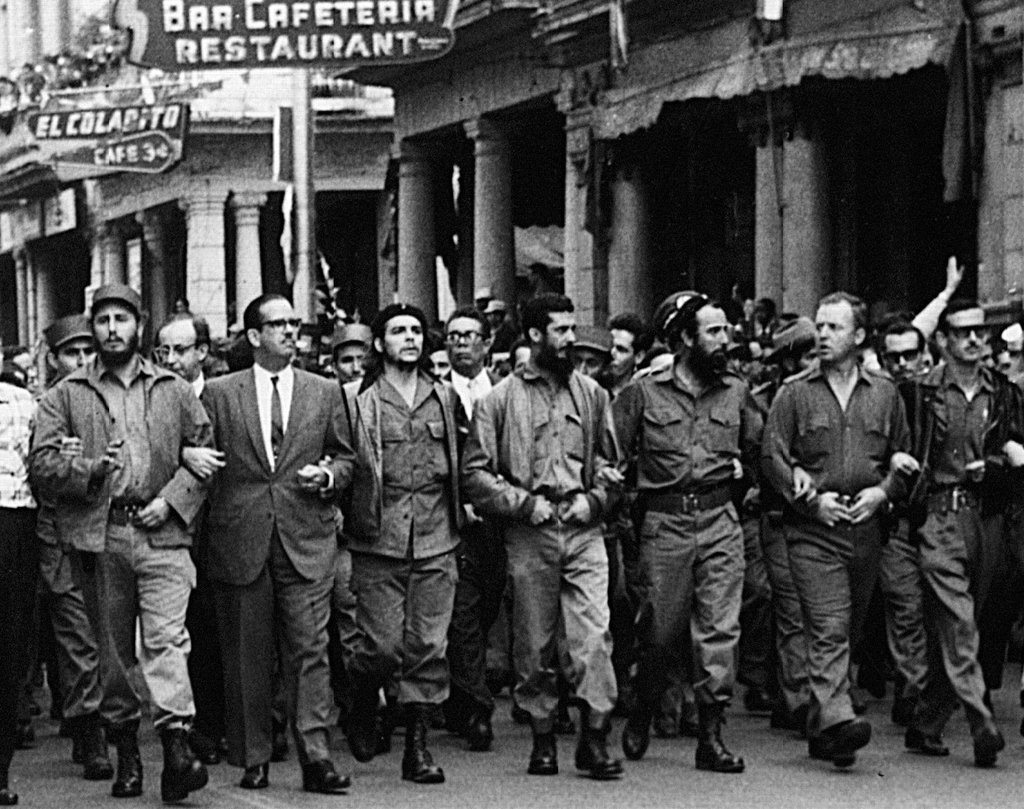
Ernesto ‘Che’ Guevara blev officielt født den 14. juni 1928 i Argentina. Che er blevet aktuelt som symbol, der ofte ses på plakater og merchandise i de omfangsrige demonstrationer, der har fundet sted i protest mod den kapitalistiske globalisering siden Seattle i december 1999
Hos Zapatisterne i Mexico og i demonstrationer verden over er billederne af Che symboler i kampen mod nyliberalismen, imperialismen og først og fremmest billedet på oprør og revolution over landegrænserne.
Indhold
Forord
Ernesto ‘Che’ Guevara blev officielt født den 14. juni 1928 i Argentina.
(I virkeligheden den 14. maj, ifølge hans mor, kilde: Anderson)
Che er blevet aktuelt som symbol, der ofte ses på plakater og merchandise i de omfangsrige demonstrationer, der har fundet sted i protest mod den kapitalistiske globalisering siden Seattle i december 1999 (*)
Hos Zapatisterne i Mexico og i demonstrationer verden over er billederne af Che symboler i kampen mod nyliberalismen, imperialismen og først og fremmest billedet på oprør og revolution over landegrænserne.
Men ingen helt fortjener at blive fordrejet eller misbrugt. Brugen af helgenbilledet af Che må ikke dække over Ches politiske opfattelser, praksis og fejl.
Vi har derfor fremhævet de artikler, der viser centrale tekster af og om Ches politiske praksis og teori om antiimperialistisk kamp, opfattelsen af socialisme, af marxismen og af guerillakrig.
Flere af bidragene er anmelderartikler af 7 politiske biografier om Che (**). (Og af Che’s egne biografiske bøger fra yderpunkterne i hans politiske udvikling; dagbøgerne fra motorcykelturen gennem Latinamerika i 1952 og fra den tragiske guerillakamp i Bolivia i 1967).
Jørgen Lund & Bjarne A. Frandsen
Påbegyndt juni 2003; revideret juni 2022
Se også på Socialistisk Bibliotek:
Emnelisten: Filmen Che af Stephen Soderbergh
Emnelisten: Alberto Corda: Che Guevara – Historien om et foto / History of an image
Personlisten: Fidel Castro og Cuba
Personlisten: Fidel Castro (1926-2016)
Tidslinjen: 4. januar 1952 om ‘dannelsesrejsen’ op gennem syd- og centralamerika.
Tidslinjen: 3. januar 1966 om OSPAAL.
Foreword
Ernesto ‘Che’ Guevara was officially born on June 14 in Argentina in 1928.
(According to his own mother it was in reality May 14, see Jon Lee Anderson).
Che has had a resurrection as a political symbol, reappering on posters and in merchandice in the movement against capitalist globalisation, that has arisen since Seattle, December 1999.(*)
At the Zapatistas in Mexico and in demonstrations worldwide the pictures of Che are symbols in the struggle against neo-liberalism, against imperialism and first and foremost they are pictures of rebellion and revolution beyond national borders.
But no hero derserves to be deflected or misused. The use of the Che icon must not be a cover up for the political conceptions, practice and errors of Che.
We have therefore emphasized articles, that are central to the political practice and theory of Che. Also articles of Che himself in the anti-imperialist struggle, his conception of socialism, of Marxism and of guerilla warfare.
Several of the contributions are review articles dealing with seven biographies on Che (**). (Together with Che own autobiographical books from both ends of his political development: the motorcycle diaries while travelling through Latin America in 1952, and the tragic guerilla fight in Bolivia in 1967).
Jørgen Lund & Bjarne A. Frandsen
June 6, 2003; revised June 2022.
* The Battle of Seattle: “Globalize This!” – on the Internet
**
Jon Lee Andersson: Che Guevara: A Revolutionary Life (1997). Dansk udgave 2007, se Bøger.
Jorge G. Casteneda: Companero: The Life and Death of Che Guevara (1997).
Mike Gonzalez: Che Guevara and the Cuban revolution (2004)
Paco Ignacio Taibo: Guevara, Also Known As Che (1998).
Mike Gonzalez: Che Guevara and the Cuban revolution (2004)
Olivier Besancenot and Michael Löwy: Che Guevara: His Revolutionary Legacy (2009)
Samuel Farber: The Politics of Che Guevara: Theory and Practice (2016)
Artikler på dansk / skandinavisk
Leksikale:
Erneste Che Guevara (Denstoredanske.dk). Ret kort intro.
Che Guevara (Wikipedia.dk)
Che Guevara (Wikipedia.no). Større norsk artikel
Se også under Leksikon for det 21. århundrede længere nede.
Arbejderen
Aleida Guevara Marc: Når jeg tænker på min far… (14. juni 2008).
“Aleida Guevara March holdt denne tale om sin far, Ernesto Che Guevara, den 4. februar 2006, da hun besøgte Danmark i forbindelse med Danmarks Sociale Forum.”
Ché Guevara – min far (3. september 2005).
Helene Caprani interviewer Camilo Guevara March (Che Guevaras søn) under hans besøg i Ålborg for at åbne Che-fotoudstilling.
Arbetarmakt
Viktor Samuelsson: Che – djärv revolutionär men inte marxist (Marxistisk Perspektiv, nr.3, hösten 1997).
“Den åttonde oktober 1967 skadades Che Guevara och togs till fånga för att sedan avrättas på order av det bolivianska militärhögkvarteret. I höst är det 30 år sedan denna tragiska händelse. Men att hedra minnet av Che betyder inte att socialister bör förhålla sig okritiska till allt som han stod för. I denna artikel går Viktor Samuelsson igenom Che Guevaras liv för att sedan gå in på en kritik av hans syn på gerillataktiken”.
Arvet efter Che Guevara – en kritisk granskning (september 1997; online på Internet Archive).
“Broschyren består av två delar. Den första utgörs av en längre recension ur FRKI:s tidskrift Trotskyist International [se under dette]. Den bok som recenseras är skriven av Jon Lee Anderson (Che Guevara: A Revolutionary Life, London 1997: Bantam Press). Den andra delen är hämtad ur boken The Degenerated Revolution (London 1982)”.
Aspekt: socialistisk tidsskrift for politik og kultur [1963-1973]
Specialnummer: Ernesto “Che” Guevara (5. årg., nr.4, marts 1968, 27 s.).
Af indholdet:
Tale i FN : uddrag af kommandant Ernesto Guevaras tale i de Forenede Nationers generalforsamling den 11. december 1964 , s.6-9.
En fælles stræben : omstyrtelsen af imperialismen forener Cuba med Afrika og Asien. Tale holdt ved den afro-asiatiske økonomiske konference i Algier i februar 1965, s.10-20.
At kæmpe overalt som i Vietnam: det er vor målsætning. Uddrag af artikel skrevet af Che Guevara of offentliggjort i Havana den 16. april 1967, s.21-27.
Autonom Infoservice
Alfred Lang: Tidsdoku. Che Guevara – Mod strømmen (8. oktober 2017).
“Hvad var det egentlig, som gjorde Ernesto “Che” Guevara så populær verden over? Er der noget fra Che’s politiske arv, som vi i dag kan blive inspireret af?”
Cikadenet
På sporet af Che, 1-2 (online på Internet Archive).
Dagbogsblade fra Bolivia 1996 af Marcela Rojas og Johnny Mortensen.
Cubavenner.dk
Cubas historie: Che Guevara
Information
Jeppe Nybye: I skyggen af Che, 1: Manden de kaldte Judas (5. august 2008).
“Alle store martyrer har deres Judas – således også Che Guevara. Men den såkaldte forræder er måske ikke så skyldig som hidtil antaget. Her kommer første del af historien om Ciro Bustos. Manden, der skulle gøre Argentina kommunistisk.” Kun online for abonnementer.
Jeppe Nybye: I skyggen af Che, 2: Den knuste drøm (6. august 2008)
“Revolutionen i Argentina slår fejl, men Ciro Bustos slipper væk og hjælper igen Che Guevara, da tak-tikken lægges om, og et nyt mål udpeges: Bolivia.”
Steen Sohn: Myten Che (5. oktober 2007).
Kronik i anledning af Steen Sohns danske oversættelse af Jon Lee Anderson store biografi, Che Guevara – biografien om mennesket og myten.
Interpress: Nyheder og Baggrund fra hele verden.
Verden mindes “Che” Guevara 1928-67 (I)
Ernesto “Che” Guevara 1928-67 (II).
“… den virkelige Guevara som revolutionær kommunist og forkæmper for den socialistiske revolution. På samme måde som det skete med Marx,Lenin og Stalin” … og om Ches økonomiske politik på Cuba.
Kommunistisk Politik
Che Guevara: Digte i liv og død (nr. 18, 14.9.-27.9.2007, side 12-13; online på Oktobernet.dk).
Om Ches yndlingsdigte. Kun de tre digte fra Pablo Nerudas Den store sang – linket under artiklen – er medtaget i trykte artikel.
Leksikon for det 21. århundrede
Vegard Bye og Albert Jensen: Guevara, Ernesto Che
“Che Guevara står i historien som en legendarisk skikkelse, men har nok givet anledning til mere revolutionsromantik end hans egen politiske praksis skulle berettige. Det var gennem hans eventyrtrang, at han blev politisk bevidstgjort, og han udviklede en urealistisk og idealistisk tro på hvordan en befrielsesproces kan gennemføres.”
Modkraft.dk
Alfred Lang: Det cubanske ikon (25. juni 2003).
“Hvad var det egentlig, som gjorde Ernesto ‘Che’ Guevara så populær verden over? Er der noget fra Che’s politiske arv, som vi i dag kan blive inspireret af? Her er historien om companero Che Guevara.”
Se ajourført udgave på Autonom Infoservice med titlen: Che Guevara – mod strømmen (14. december 2015).
Offensiv: Rättvisepartiet Socialisternas veckotidning
Sommarspecial 2005: Che Guevaras liv och kamp (online på Internet Archive WayBackMachine).
Dagens intresse för Che Guevara ska ses mot bakgrund av växande globala protester mot fattigdom, imperialism och krig. .. Che och Kuba har av många betraktats som en symbol för motstånd. Indhold: De första åren i Argentina – På resa i Latinamerika – Ansluter sig till 26 juli-rörelsen och kampen på Kuba – Med Granma till Kuba – ”Det nya Kuba” skapas – Hur skulle det ”nya Kuba” byggas och styras? – Till Kongo och Bolivia – Ches sista år – Kuba – vägen framåt.
Revolution
Karen Larsen: Che: Revolutionshelten der aldrig vil dø (19. oktober 2009).
“I denne artikel ser vi nærmere på den politiske arv fra Che Guevara: både de svage sider som fokuseringen på guerillakamp, men også de stærke sider – Che Guevaras ukuelige internationalisme og hans kamp imod privilegier og bureaukrati.”
Røde Mor [sangtekst]
Røde Mor’s CD Boxsæt: Johny Gennem Ild og Vand (1970):
Sangen om Che Guevara: Tommy Flugt, digt/ Lars Trier, musik. (Fra Røde Mor: Illustreret Sangbog, Rhodos, 1971).
“For cubanere og for mange i vesten symbolet på den absolut dadelfrie og idealistiske revolutionære humanist og socialist i sidste halvdel af det 20. århundrede.”
Socialistisk Arbejderavis
Judith Orr: Che!: fra rebel til ikon (pdf) (særnummer: En anden verden er mulig, august 2004, s.8; online på Internet Archive).
“Hvad var det, der gjorde, at Che Guevara kom til at handle politisk? Hvordan forandredes hans meninger? Hvordan blev han kendt over hele verden i sit korte liv, og hvorfor inspirerer han stadig så mange mennesker?”
Martin Johansen: Hvem var Che Guevara? (nr.163, 31. juli 1997, s.6; online på Internet Archive).
“… en ukritisk heltedyrkelse yder ikke Che Guevara retfærdighed. Det er nødvendigt at tage hans gerninger og meninger op til en uromantisk, men respektfuld vurdering”.
Jørgen Lund: Historien om en helt (nr.86, november 1992, s.10).
“Che Guevara – leder i den cubanske revolution – døde for 25 år siden. Che blev en helt og en myte. Ideen og troen på guerillakamp som vejen til revolution inspirerede titusinder af unge på venstrefløjen”.
Socialistisk Information
Michael Löwy: Langt om længe: ‘Kritiske noter’ af Che Guevara (pdf) (nr.217, april 2007, s.12-13). Scroll ned.
“Vi har ventet længe, meget længe, på udgivelsen af denne bog1. Den består af kritiske noter til ‘Håndbog i Sovjetunionens politiske økonomi’ (den spanske udgave). Che Guevara skrev disse noter under sit ophold i Tanzania og Prag i 1965- 66, efter hans fejlslagne mission til Congo, og før hans afrejse til Bolivia.” Scroll ned.
Michael Lövy: Che på sporet af en ny socialisme (nr.174, marts 2003, s.26-31).
“Den argentinsk fødte revolutionsleder Ernesto Che Guevara ville ikke være med til at kopiere den østeuropæiske model i Cuba og søgte i årene op til sin død i 1967 efter et alternativ baseret på befolkningens egne beslutninger”.
Socialistisk Revy
Mike Gonzalez: Che Guevara – den revolutionære helgen (nr.1, februar 1998, s.21-23; online på Internet Archive).
“Che Guevara er stadig et symbol for revolutionær kamp. Mike Gonzales ser bag om myten og manden, hvis strategi ledte til nederlag trods dens heltemodige karakter.”
(Oversættelse af The lost generation – the life and politics of Che Guevara (Socialist Review, Issue 112, October 1997; online at Internet Archive).
Solidaritet
Albert Jensen: Drømmen består: 30 året efter mordet på Che Guevara (nr.2, september 1997, s.18-35).
“Den 9. oktober er det 30 år siden generalerne slog Che Guevara ihjel i Bolivia … Che var ikke mere, men myten om den ukuelige, disciplinerede og konsekvente revolutionære spredte sig over hele jorden. Det samme gjorde drømmen om revolutionen og udviklingen af socialismen på verdensplan. Istedet for at forsvinde blev Che udødeliggjort, gjort til en ikon i den cubanske revolution og til symbol for.
Yelah.net
Mattias Pettersson: Che Guevara avrättade syndikalister (Direkte Aktion, nr.3, 2001; online på Internet Archive).
”Den unga vänsterrörelsen håller sig med många tvivelaktiga ikoner. I detta nummer av Direkt Aktion ska vi titta närmare på en av de vanligaste, Ernesto Che Guevara. Känd från t-shirts, pins, skivor, nyckelringar, tygmärken och flaggor”.
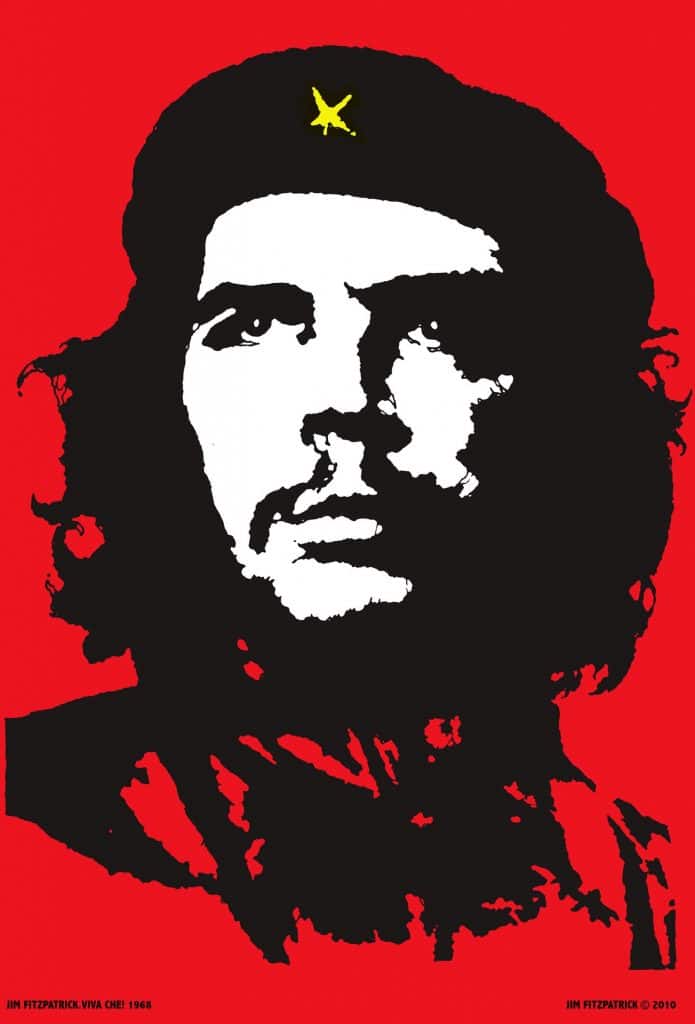
Articles in English
Against the Current
Michael Löwy: The CIA’s death machine at work (Issue 156, January-February 2012). Review of Michael Ratner and Michael Steven Smith, Who Killed Che? How the CIA got away with murder (Or Books, 2011).
“Using internal U.S. governmental documentation, only recently released, the authors use their forensic skills to analyze the evidence of the CIA’s involvement in the execution of a war prisoner captured alive.”
Kit Adam Wainer: Looking at Che Guevara (No.143, November/December 2009). Review of Olivier Besancenot and Michael Löwy, Che Guevara: His Revolutionary Legacy (Monthly Review Press, 2009).
“Their commitment to the construction of a usable Che leads them, however, to downplay Che’s rejection of democracy as the antidote to bureaucratic ‘Marxism’, and to ignore evidence which contradicts their characterization of Che as an opponent of Stalinism.”
See also debate:
Peter Drucker: A letter on Che (No.144, January/February 2010).
Charlie Post: On the legacy of Che Guevara (No.146, May/June 2010).
Michael Löwy: An answer to Charlie Post (No.146, May/June 2010).
Michael Löwy: Che Guevara in search of a new socialism (No.142, September/October 2009).
“Che’s ideas on the construction of socialism are an attempt at ‘heroic creation’ of something new, the search – interrupted and incomplete – for a distinct model of socialism, radically opposed in many respects to the ‘actually existing’ bureaucratic caricature.”
Counterfire
Ralph Graham-Leigh: Che Guevara: Diary of a Combatant (Counterfire, 14 March 2014). Review of Ernesto Che Guevara, Diary of a Combatant, edited by Maria del Carmen Ariet (Ocean Press, 2013, 358 p.).
“Guevara’s diary during his time as a guerrilla in Cuba gives an unfiltered impression of both the man and of war during the Cuban revolution.”
Che Guevara and the Cuban Revolution. Part 97 in Neil Faulkner: A Marxist History of the World (Counterfire, 14 October 2012).
“The reforms that Fidel Castro introduced after the overthrow of the Batista dictatorship were real, but they were bestowed from above and straitjacketed by poverty.”
Elaine Graham-Leigh: Who Killed Che? How the CIA got away with murder (8 December 2011). Review of Michael Ratner and Michael Steven Smith, Who Killed Che? How the CIA got away with murder (OR Books, 2011).
“The latest documents surrounding Che Guevara’s death exposes the US government’s track record of assassinations since the 1950s, and demonstrates how the War on Terror is also a war on the rule of law.”
Fight racism! Fight imperialism!
Diana Raby: A master class in socialist economics (Issue 209, June/July 2009; online at Internet Archive). Review of Helen Yaffe, Che Guevara: the economics of revolution (Palgrave Macmillan, 2009).
“On the basis of 60 interviews with Che’s former colleagues and extensive archival research, including consultation of Guevara’s crucial notes for a critique of the Soviet Manual of political economy, Yaffe gives us unprecedented insight into his vital contribution to the Cuban Revolution and to Marxist theory.”
Green Left Weekly
Stuart Munckton: Che Guevara’s legacy lives on in Latin America (Issue 727, 6 October 2007).
“As the 40th anniversary of the death of Argentinean-born revolutionary Ernesto ‘Che’ Guevara, murdered in Bolivia on October 9, 1967, on the orders of the CIA, arrives, there is increasing evidence that his spirit of struggle against injustice continues to get stronger in Latin America.”
In Defence of Marxism
Alan Woods: “Che” – an icon? The life and ideas of Ernesto Guevara (9 October 2007).
“On the 40th anniversary of his death it is appropriate that we make a balance sheet of this outstanding revolutionary and martyr. Alan Woods looks at the evolution of Che Guevara from his early days to the day he was killed.”
International Socialism
Mike Gonzalez: The resurrections of Che Guevara (No.77, Winter 1997, p.51-80)
“Che Guevara is still a symbol of resistance – and for good reason: he represents one of the few revolutions to have faced-down the might of American imperialism. But why did Che’s strategy so tragically end in his own death when he tried to export it to other countries? Mike Gonzalez takes a sympathetic but critical look at Che’s life and achievements.”
International Viewpoint
Michael Löwy: The long-waited appearance of an unpublished book by Ernesto Che Guevara: Critical Notes on Political Economy (No.386, February 2007).
“We have been waiting a long time, a very long time, for this book to be published. It consists of critical notes on the Manual of Political Economy of the USSR (the Spanish language edition of 1963), notes which Che Guevara edited during his stay in Tanzania and in Prague in 1965-66, after the failure of his mission to the Congo and before leaving for Bolivia.”
Jacobin: Reason in Revolt
David Seddon: Che Guevara in the Congo (4 April 2017).
“Che Guevara’s expedition in the Congo, though ill-fated, stands as a crucial example of anti-imperialist solidarity.”
Samuel Farber: Assessing Che (23 May 2016).
“Che Guevara was an honest and committed revolutionary. But he never embraced socialism in its most democratic essence.”
James Bloodworth: The cult of Che (9 March 2011)
“The myth of Che Guevara’s virtue set against the decline of the Cuban revolution, however, is false. The romanticism around Che skirts over the unpalatable truths about the revolutionary’s life and conduct.”
Labour Worker
Peter Sedgwick: Guevara: right or wrong? (January 1968).
“Three months after Che’s death, we are no nearer to burying him. Ian Birchall wrote an obituary of the man in the November issue. It seemed to some of us to be an inadequate assessment, and the following letter (here slightly shortened) was sent to the editor.”
LeftWord
Ernesto ‘Che’ Guevara: On Socialism and Internationalism (pdf) (2020, 90 p.).
“These texts, with insight from Aijaz Ahmad and María del Carmen Ariet García, provide us with a clear and resolute summation of Che’s spirit of conviction, scientific insights, human compassion, and unrelenting will to achieve the victory of the oppressed over the oppressors.”
Marx & Philosophy Review of Books
Eduardo Frajman: The Political Theory of Che Guevara (1 October 2018). Review of Renzo Llorente’s book (Rowman & Littlefield International, 2018, 196 p.).
“Llorente has chosen to present Guevara’s thought in a wholly sympathetic light, less as a response to the vituperations of the Right than to the tendency in the Left to downplay Guevara’s theories as superficial, unrealistic, doctrinaire or as artifacts of their own time.” See also review by Sean Ledwith (ibid., 31 October 2018).
Marxists Internet Archive
Raya Dunayevskaya: The double tragedy of Che Guevara (1967)
“To work out a new relationship of guerrilla fighting to social revolution, .. of the class struggles of the factory workers and those of agricultural laborers remains the task. In this way alone can the death of Che Guevara become a movement …”
Monthly Review
James D. Cockcroft: Who killed Che? (Vol.64, No.1, May 2012). Review of Michael Ratner and Michael Steven Smith, Who Killed Che? How the CIA Got Away With Murder (OR Books, 2011).
“The Ratner-Smith bombshell is a quick, illuminating, and exciting read.”
Remembering Che Guevara – forty years on (Vol.59, No.6, November 2007):
John J. Simon: The death and life of Che
Eduardo Galeano: Magic death for a magic life (1968).
Che Guevara: Cuba and the U.S. (Vol.13, No.4, September 1961).
“The questions were submitted, in writing, to Comandante Guevara by Leo Huberman during the week of the invasion; the answers were received the end of June …”
MR Online
John Riddell: Che Guevara’s final verdict on the Soviet economy (June 12, 2008).
“One of the most important developments in Cuban Marxism in recent years has been increased attention to the writings of Ernesto Che Guevara on the economics and politics of the transition to socialism.”
NACLA: Reporting on the Americas
Carlos Vilas: Anniversary essay: Regis debray on Che Guevara (Vol.30, No.3, November-December 1997).
“Here, by way of a sharp critique of the political thought and practice of the French intellectual Regis Debray, Carlos Vilas reconsiders the meaning of Che Guevara’s death in Bolivia, 30 years ago next October.”
National Security Archive Electronic Briefing Book (No. 5)
Peter Kornbluh: The death of Che Guevara: Declassified (1997)
“Declassified documents from the US National Security Agency regarding the death of Che Guevara.”
New Politics: A Journal of Socialist Thought
Samuel Farber: The Resurrection of Che Guevara (Vol.7, No.1, Whole No.25, Summer 1998).
“There are attractive aspects of Che Guevara. .. In the last analysis, however, the political question remains: was Che Guevara a friend or foe of emancipatory, liberatory politics? The historical record is clear; Guevaraism is incompatible with the struggle to build an egalitarian and democratic society, a society in which working people decide their own fate without reliance on ‘well-intentioned saviors’.”
Organise: For class struggle anarchism
Che Guevara – a second myth is exploded (Issue 47, Winter 1997/98; online at Internet Archive).
“… there seems to be a revival among the young in the idea of Che as idealistic hero and fighter for freedom. This hero cult seems to have infected many young radicals … The truth may be unpalatable to many.” Tidligere dansk oversættelse på nettet: Mord på myten Che (Sabot, nr. 1, 2002).
Red Pepper
Che Guevara: The economics of revolution (June 2009).
“Helen Yaffe explores impact of Che Guevara as an economist and politician in her new book (Palgrave Macmillan, 2009).”
Revolutionary History
Thirty years since the death of Ernesto Guevara (Vol.7, No.3, 2000, p.262-277).
“An interview with Ricardo Napuri … a Peruvian, and has been involved in politics and revolutionary activities for 50 years.”
RS21: Revolutionary Socialism in the 21st Century
A flawed revolutionary icon. By Mike Gonzalez (September 4, 2016). Review of Samuel Farber, The Politics of Che Guevara: Theory and Practice (Haymarket Books, 2016, 162 p.).
“What impresses in Farber’s book is the way in which he interweaves a critical assessment of Guevara’s politics with general arguments about the meaning of socialism.” See also Samuel Farber’s Introduction: Che Guevara’s political relevance today (International Socialist Review, Issue 101, Summer 2016) + Samuel Farber: Assessing Che (Jacobin: Reason in Revolt, 23 May 2016) + Peter Solenberger: The paradox of Che Guevara (Against the Current, Issue 185, November-December 2016) + Hector Reyes: The real tragedy of Che Guevara’s life (New Politics: A Journal of Socialist Thought, Issue 63, Summer 2017) + Pablo Velasco: Guevara is not our hero (Solidarity & Workers Liberty, Issue 443, 3 July 2017)
The Socialist
Paul Hunt & Dave Carr: Che Guevara – Revolutionary Fighter (4 October 2002).
“… review the life and times of this icon of anti-capitalism and social liberation.”
Socialist Review
Esme Choonara: Che Guevara (Issue 336, May 2009). Review of Olivier Besancenot and Michael Lowy, Che Guevara: His Revolutionary Legacy (Monthly Review Press, 2009)
“The book does a useful job of drawing out Che’s developing critique of Stalinism using material from his diaries, speeches and writings.”
Che from rebel to icon (Issue 287, July/August 2004).
“Christophe Chataigné spoke to author Mike Gonzalez about Che Guevara’s life and legacy.”
Chris Harman: South America’s new revolt (Issue 287, July-August 2004).
“Che Guevara’s vision of continental revolution is being revived, but political leadership remains essential.”
Socialist Worker (UK)
Judith Orr: Che: his life and legacy (Issue 1907, June 26, 2004).
“Che Guevara’s face is everywhere. But how much do we know about the man behind the myths, asks Judith Orr. A great new book from Mike Gonzalez: Che Guevara and the Cuban Revolution (London, Bookmarks, 2004), gives answers to these and many other questions about the life and politics of Che.”
Også på dansk ovenover under Socialistisk Arbejderavis
Socialist Worker (US)
Todd Chretien: Who was Che?: the legacy of a revolutionary (Issue 648, October 12, 2007).
“Che Guevara’s image has inspired millions of people who want to fight for a better world. But very few people, especially in the U.S., know much about his life or politics. Todd Chretien looks beyond the image to describe Che’s real life, actions and ideas.”
Socialistworld.net
Tony Saunois: Che Guevara – symbol of struggle (1997; online på Internet Archive).
“During 1996 and 1997 numerous books, pamphlets and articles have been published by assorted writers about Ernesto Guevara to commemorate the thirtieth anniversary of his execution. Throughout the world he is known simply as ‘Che’. He was given this nickname by friends and comrades in struggle when he was in Mexico during the 1950s. Che is a commonly used term in Argentina – his native country. In 1997 young people in Latin America and Europe have begun to wear Che Guevara T-shirts and display posters of his portrait”.
Solidarity
Paul Hampton: Guevara the economist? Workers short-changed (3/157, 20 August 2009). Review of Helen Yaffe Che Guevara: the economics of revolution (Palgrave Macmillan, 2009).
“Yaffe’s book contains new material that merits discussion. It is the product of a PhD thesis, involving 60 interviews with nearly 50 of Guevara’s closest collaborators. It reviews Guevara’s so-called ‘great debate’ about economic planning in the mid-1960s, but also lesser known elements, such as his critique of the Soviet manual of political economy.”
Paul Hampton: No hero of ours (3/57, 2 September 2004). Review of Mike Gozalez Che Guevara and the Cuban Revolution (Bookmarks, 2004).
“Much that has been written about Guevara glosses over the essentials of his politics. This book does little to dispel the myths and even seeks to reclaim him for the revolutionary socialist tradition. Gonzalez obscures important differences between Guevara’s ‘revolutionary’ Stalinism and authentic working class socialism.”
State of Nature
On Che Guevara: An interview with Jon Lee Anderson by Cihan Aksan and Jon Bailes (Spring 2010; online at Internet Archive WayBackMachine).
“To sit in judgement of these historical phenomena and indict Cuba’s revolution as a failed social experiment, to blast the left for having the temerity to take up arms when it could have been done another way, that’s revisionism of the crassest type.”
Trotskyist International
Mark Abram: Che Guevara: the man, his struggles, his ideas (No.22, July-December 1977, p.50-59; online at Internet Archive WayBackMachine).
“While not indulging in the cult of the personality, Anderson’s book bears witness to the power of Che’s personality; a driving, self-sacrificing, utterly demanding character … It is not an iconoclastic biography; nor is it a critique of Guevara’s ideas. It does not challenge Guevara’s writings on guerrillaism, nor his positions in the debates among the Cuban leaders over the transition to socialism, for example. But it does provide new information that allows a clearer appreciation of Guevara’s relations with Fidel Castro, with Cuban Stalinism and his changing views on the USSR and China”.
The Unrepentant Marxist
Louis Proyect: Was Che Guevara a Stalinist? (December 12, 2012).
“Working my way at a leisurely pace through Sam Farber’s egregiously wrongheaded Cuba Since the Revolution of 1959, I came across this remarkable comparison between Joseph Stalin’s foreign policy and Che’s: …”
Workers’ Liberty
Pablo Velasco: Guevara is not our hero (3 July 2017).
“Guevara was never a working class socialist nor even a revolutionary democrat. He helped overthrow the hated dictator Batista in Cuba, but only to replace it with a Stalinist regime.”
Che Guevara: the politics behind the icon (28 May 2007)
“Much that has been written about Guevara glosses over the essentials of his politics. Need to dispel the myths and reject attempts reclaim him for the revolutionary socialist tradition or the anti-capitalist movement. Clarify important differences between Guevara’s ‘revolutionary’ Stalinism and authentic working class socialism.”
Websites
Che-Lives.com
(previous: Che Guevara Page)
“Che Guevara documents, pictures, sound and video files”.
Archive (Bios, writings, speeches, articles, audio speech samples, video samples) – Gallery – Download (images, speeches, video) – Links.
Cuba Va!: Webbplatsen för solidariteten med Kuba i Sverige
Svensk-Kubanska Föreningen
Che Guevara Page:
Che Guevaras Liv (skoluppsats)
Artikel: Socialismen och människan på Kuba (pdf)
Che på Kuba (Sammanfattat ur “Ernesto Guevara, También conocido como El Che”.)
Dansk-Cubansk Forening (Cubavenner.dk)
Ché Guevara
Artikler om Che Guevara.
Marxistarkiv.se
Che Guevara
Texter av och om Che Guevara.
Marxists Internet Archive
Che Guevara Internet Archive
Library, Biography, Images, Audio.
Svensk avdelning, bl.a.: Socialismen och Människan på Kuba (1967) + Dagbok från Bolivia (1966-67)
Viden er magt (online på Internet Archive WayBackMachine)
Sektion Cuba SI (sitemap)
Ernesto Che Guevara, se menu foroven.
Wikipedia: the free encyclopedia
Che Guevara
Contents: Youth – Guatemala – Cuba – Revolutionary government – Congo – Disappearance from Cuba – Bolivia – The Bolivian Diary – Hero Cult – Writings by Che Guevara – Writings about Che Guevara – Related Topics – Related Links.
Bøger
Bøger og pjecer på dansk (+ svensk) af og om Che Guevara.
Che: hans fantantiske liv og skæbne
Af Björn Kumm (Schønberg, 2008, 312 s.).
Che Guevara: biografien om mennesket og myten
Af Jon Lee Anderson (Forlaget Sohn, 2007, 743 s.).
Interview med forfatteren: Che – meget mere end blot en T-shirt (Information.dk, 16. november 2007).
Anmeldelse af Ken Bruun: Der er meget mere at fortælle om Che Guevara (Arbejderen, 18.10.2007).
On Che Guevara: An interview with Jon Lee Anderson by Cihan Aksan and Jon Bailes (State of Nature, Spring 2010; online at Internet Archive WayBackMachine).
Frihedskæmperen Ché Guevara
Red. Sven-Erik Simonsen (Dansk-Cubansk Forening, 2005, 144 s.)
Udvidet udgave af Stig Frey Larsens Ernesto Che Guevara (Dansk-Cubansk Forening, 1978, 99 s.). Med bl.a. Fidel Castro Mindetale – 20 år efter (1987), s. 107-37; Helene Caprani: Ché Guevara – min far (2005), s. 137-40 og Erik Stinus: Che – streger til et portræt (1987).
Che Guevara – en revolutionär humanist
Av Michael Löwy (Röda Rummet, 1997, 150 s.; online på Marxistsarkiv.se).
Vi er praktiske revolutionære: tekster til belysning af den latinamerikanske revolution
Af Fidel Castro, Régis Debray og Ernesto Che Cuevara. I udvalg ved Claus Clausen og Peter Larsen, oversat af Annelise Malmgren og Per Åge Brandt (Rhodos, 1968, 244 s.).
Af indholdet (Che Guevara):
Vi er praktiske revolutionære: Noter til studiet af den cubanske revolutions ideologi (1960), s. 40-48.
Cuba: Særtilfælde eller avantgarde i kampen mod imperialismen? (1961), s. 49-62.
Vor fælles stræben: Tale ved den afro-asiatiske solidaritetskonference i Algier 26. februar, 1965, s. 63-74.
Mennesket og socialismen på Cuba: brev til Carlos Quijano, redaktør af ugebladet Marcha i Uruguay (1965), s. 75-91.
To, tre, mange Vietnam! (1967), s. 92-106.
Che lever!
(Dansk-Cubansk Forening, 1988, 52 A4-sider).
En samling af artikler på dansk, oversat fra cubanske tidsskrifter, indeholdene interview med venner og familie + en større tale (17 sider) af Fidel Castro 8. okt. 1987.
Ernesto Che Guevara
Af Stig Frey Larsen (Dansk-Cubansk Forening, 1978, 99 s.). Bogen er online i uddrag på Dansk-Cubansk Forening (via Internet Archive WayBackMachine).
Den store rebel: Che Guevara i Bolivia.
Af Luis J. Gonzales og Gustava A. Sanchez Salazar. Oversat fra amerikansk af Ib Christiansen (Thanning & Appel, 1969, 230 s.).
Ernesto Che Guevaras dagbog: 7. november 1966 – 7. oktober 1967 i Bolivia
Af Ernesto Che Guevara. Forord af Fidel Castro, på dansk ved Inger Birch, Alfred Kohl, Andrés Engelhardt (Paludan, 1968, 221 s.).
Dagbog fra Bolivia
Af Ernesto Che Guevara. Oversat af Jens Juhl Jensen og Hans-Jørgen Andersen, red. Claus Clausen (Rhodos, 1968, 214 s.).
Che Guevaras dagbog fra Bolivia
Af Ernesto Che Guevara. Forord af Fidel Castro, oversat fra spansk af Jan Stage (Gyldendal, 1968, 249 s.).
Guerillakrig
Af Ernesto Che Guevara. Oversat af Erik Nordstrøm (Demos, 1971, 120 s.). (Imperialistserien; nr. 5/6).
Mennesket og socialismen i Cuba (1965)
Af Ernesto Che Guevara (Dansk-Cubansk Forening, ca. 1990), 12 A4-blade.
Rejse gennem Sydamerika: optegnelser
Af Ernesto Che Guevara (Lindhardt og Ringhof, 2000, 143 s.).
2. udgave, 2002 (L&R Pocket)
Spanske titel: Un diario per un viaggio in motocicletta
Che Guevaras dagbøger for otte måneders rejse op gennem Sydamerika på motorcykel i 1951. Filmatiseret som Motorcykel Dagbog (Motorcyckle Diaries, instr. Walter Salles, 2003)
Se også: The Motorcycle Diaries (film) (Wikipedia.org).
Se også på Tidslinjen om turen: 4. januar 1952
Revolution: artikler, taler og breve
Af Ernesto Che Guevara. Udvalg, forord og oversættelse ved Jan Stage (Gyldendal, 1968, 186 s.).
Af indholdet:
Partisankrig – en metode (1963), s.19-39.
Socialismen og mennesket i Cuba (1965), s.40-59.
At kæmpe overalt som i Vietnam (1967), s.60-77.
Mod bureaukratismen (1963), s.89-97.
Tale på det afroasiatiske, økonomiske seminar (1965), s.110-123.
Tale i De Forenede Nationer (1963), s.124-158.
Books in English:
Che Guevara and the Cuban Revolution. By Mike Gonzales. (Bookmarks, 204, 186 sider).
















